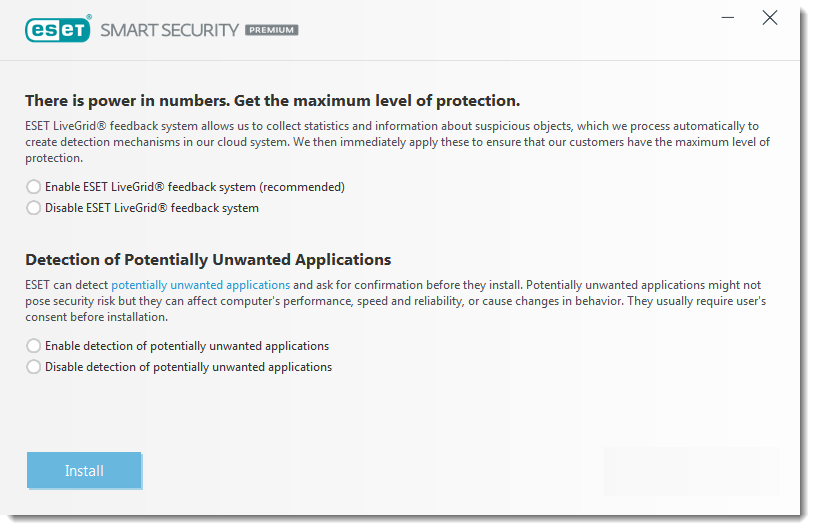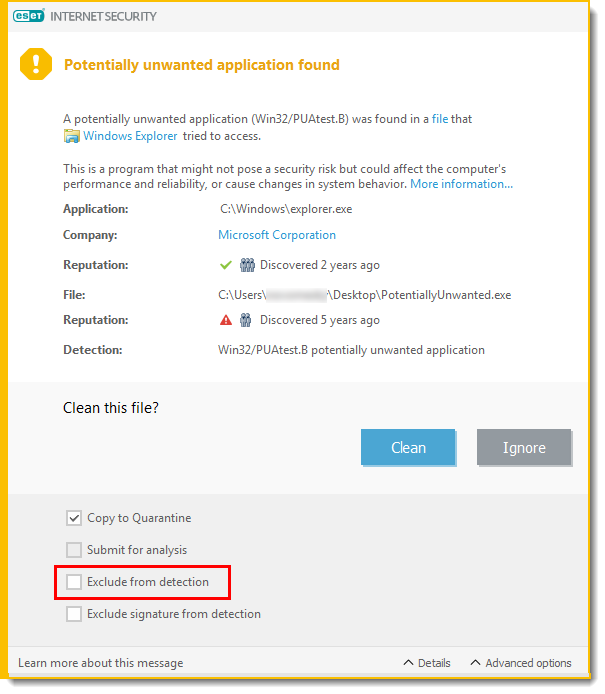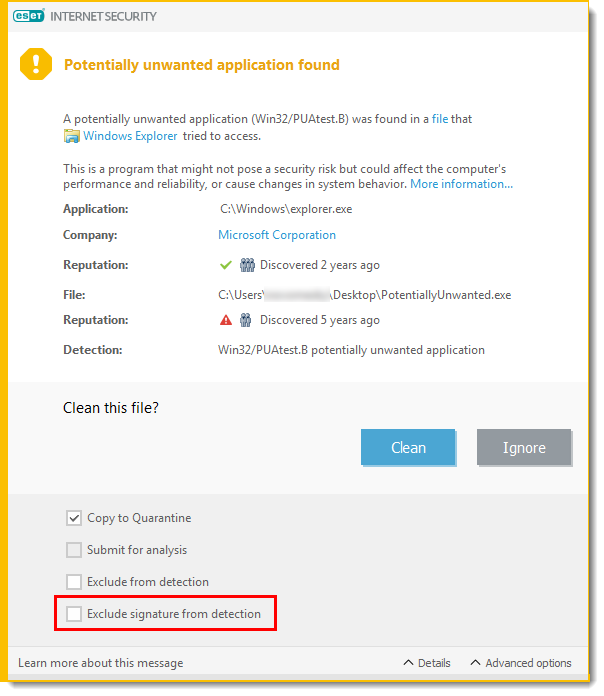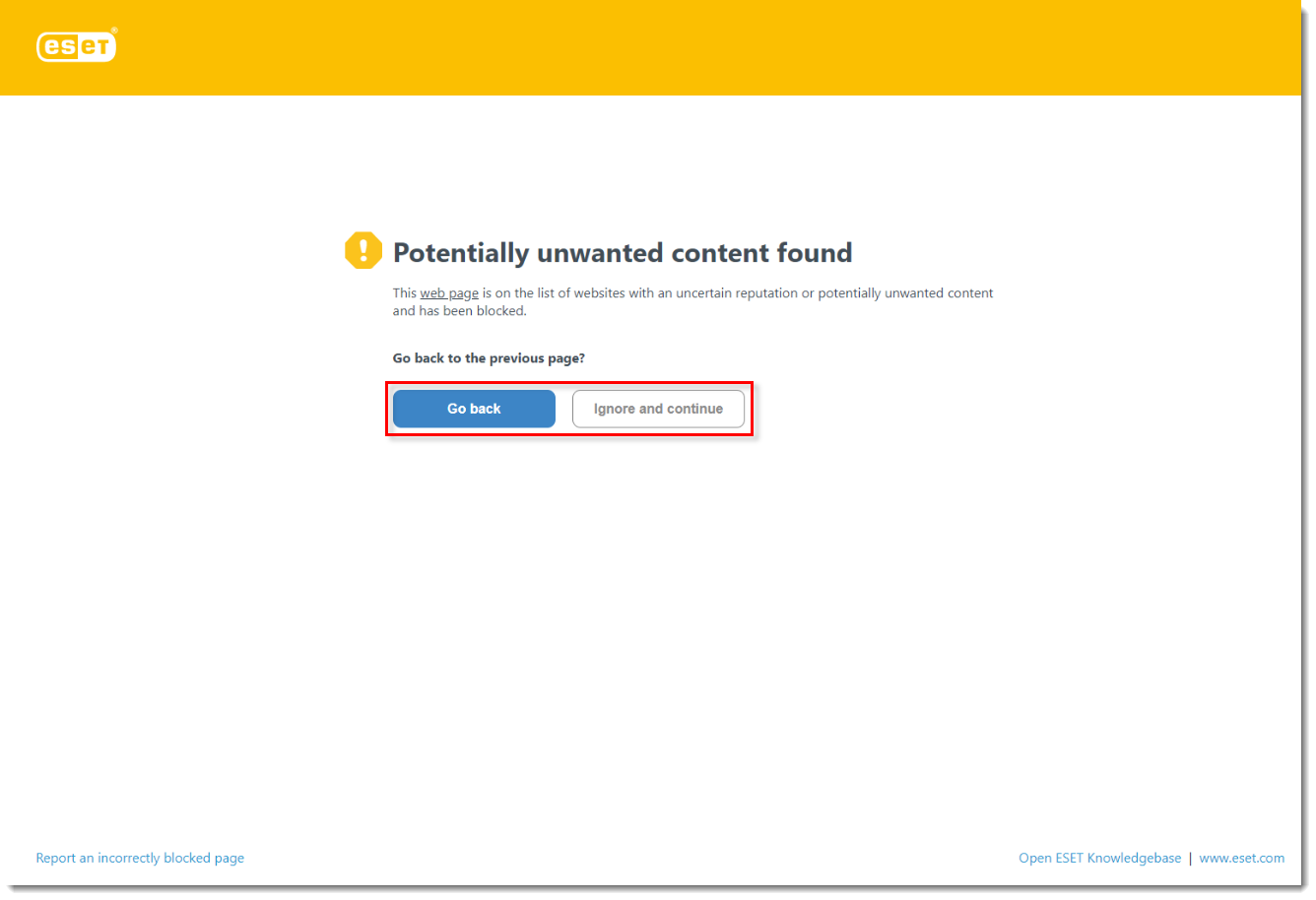Problema
- Aplicații potențial nedorite
- Avertisment - A fost găsită o aplicație potențial nedorită
- Aplicații potențial nedorite - Învelișuri software
- Aplicații potențial nedorite - Curățător de registru
- Conținut potențial nedorit
Soluție
Aplicații potențial nedorite
O aplicație potențial nedorită (PUA) este un program care conține adware, instalează bare de instrumente sau are alte obiective neclare. Există unele situații în care un utilizator poate considera că beneficiile unei aplicații potențial nedorite depășesc riscurile.
Din acest motiv, ESET atribuie unor astfel de aplicații o categorie de risc mai mică în comparație cu alte tipuri de software malițios, cum ar fi troienii sau viermii. În timpul instalării produsului ESET, puteți decide dacă activați sau nu detectarea PUA-urilor, după cum se arată mai jos:

Puteți modifica oricând setările de configurare PUA în setările programului dumneavoastră. Consultați următorul articol din baza de cunoștințe pentru instrucțiuni privind comutarea modurilor de detecție:
Configurați produsele ESET pentru a detecta sau ignora aplicațiile nedorite, nesigure și suspecte
Avertizare - S-a găsit o aplicație potențial nedorită
Atunci când este detectată o PUA, veți putea decide ce măsuri să luați:
- Deconectare/Curățare: Această opțiune încheie acțiunea și împiedică PUA să intre în sistemul dumneavoastră. Veți vedea opțiunea Disconnect (Deconectare ) pentru notificările PUA în timpul descărcării de pe un site web și opțiunea Clean (Curățare ) pentru notificările pentru un fișier de pe disc.
- Ignore (Ignoră): Această opțiune permite unui PUA să intre în sistemul dumneavoastră.
- Exclude from detection (Exclude de la detecție): Pentru a permite ca fișierul detectat care se află deja pe computer să ruleze în viitor fără întrerupere, faceți clic pe Advanced options (Opțiuni avansate), bifați caseta de selectare de lângă Exclude from detection (Excludere de la detectare ) și faceți clic pe Ignore (Ignorare).

- Excluderea semnăturii de la detectare: Pentru a permite tuturor fișierelor identificate de un nume de detecție specific (semnătură) să ruleze pe computer în viitor fără întrerupere (din fișierele existente sau din descărcarea de pe web), faceți clic pe Advanced Options (Opțiuni avansate), selectați caseta de selectare de lângă Exclude signature from detection (Exclude semnătura de la detecție ) și faceți clic pe Ignore (Ignoră)
Dacă imediat după aceea sunt afișate ferestre de detecție suplimentare cu un nume de detecție identic, faceți clic pe Ignore (Ignorare ) pentru a le închide (orice ferestre suplimentare sunt legate de o detecție care a avut loc înainte de a exclude semnătura de la detecție).

Aplicații potențial nedorite - Înfășurători de software
Un software wrapper este un tip special de modificare a aplicației care este utilizat de unele site-uri web de găzduire a fișierelor. Este un instrument terț care instalează programul pe care intenționați să îl descărcați, dar adaugă software suplimentar, cum ar fi bare de instrumente sau adware.
Software-ul suplimentar poate, de asemenea, să aducă modificări la pagina de pornire a browserului dvs. web și la setările de căutare. Adesea, site-urile web de găzduire a fișierelor nu notifică vânzătorul de software sau destinatarul descărcării că au fost efectuate modificări și deseori ascund opțiunile de dezactivare. Din aceste motive, ESET clasifică software wrappers ca fiind un tip de PUA pentru a permite utilizatorilor să accepte sau nu descărcarea.
Aplicații potențial nedorite - curățători de registru
Registry cleaners sunt programe care pot sugera că baza de date a registrului Windows necesită întreținere sau curățare periodică. Utilizarea unui curățător de registru ar putea introduce anumite riscuri pentru sistemul dumneavoastră de computer.
În plus, unii curățători de registru fac afirmații necalificate, neverificabile sau care nu pot fi susținute în alt mod cu privire la beneficiile lor și/sau generează rapoarte înșelătoare despre un sistem informatic pe baza rezultatelor unei "scanări gratuite". Aceste afirmații și rapoarte înșelătoare urmăresc să vă convingă să achiziționați o versiune completă sau un abonament, de obicei fără a vă permite să evaluați programul de curățare a registrului înainte de a plăti. Din aceste motive, ESET clasifică astfel de programe ca fiind PUA și vă oferă opțiunea de a le permite sau de a le bloca.
Conținut potențial nedorit
Dacă detectarea PUA este activată în produsul ESET, site-urile web care au reputația de a promova PUA sau care au reputația de a induce utilizatorii în eroare pentru a efectua acțiuni care ar putea avea implicații negative asupra sistemului sau a experienței lor de navigare vor fi blocate ca fiind conținut potențial nedorit.
Dacă primiți o notificare care vă anunță că un site web pe care încercați să îl vizitați este clasificat ca fiind conținut potențial nedorit, puteți face clic pe Go back (Înapoi ) pentru a vă îndepărta de pagina web blocată sau faceți clic pe Ignore (Ignoră) și continuați să permiteți încărcarea site-ului.
